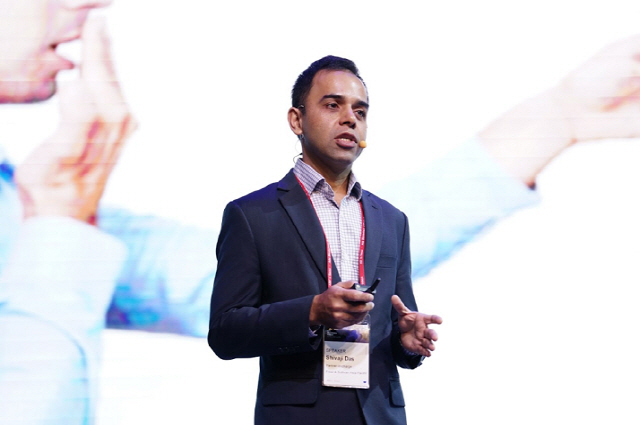
“Blockchain technology is still a relatively new concept and has not reached significant levels of maturity. There must be a convergence with existing technologies to bring revolutionary changes.”
Shivaji Das, partner and managing director for Asia-Pacific at Frost & Sullivan, made the remarks in his presentation on the “convergence of blockchain: redesigning the human paradigm” Tuesday on the second day of the “fuze 2018” at Shilla Hotel, saying that blockchain could be more powerful with the simultaneous use of such services as IoT (Internet of Things) and artificial engineering. Frost & Sullivan is a global market research and business consulting company operating more than 40 offices around the world.
Das said blockchain has a great potential for growth but admitted that there are still limitations. “A look at revenue changes shows that America‘s blockchain industry has a chance of growing 70% further. But there are still the shortage of developers and platform experts and communication and legal problems,” he said, adding that many projects are going on in the U.S. and other countries but international cooperation is still in its infancy.
Das nonetheless said many companies have shown interest in adopting blockchain and is trying to apply blockchain technology to existing industries. “Nearly 85% of Singaporean companies are looking at blockchain to introduce and utilize the technology,” he said, noting that blockchain technology is widely used in finance, energy, manufacturing, transport and logistics and global trade
He also exemplifies a case in which blockchain has been used to simplify complex procedures. “IBM and Maersk established a joint venture to streamline customs clearance procedures and get rid of documentation,” Das said. The two companies have developed “TradeLens,” a blockchain-based supply chain solution for the shipping industry, in which 94 companies are taking part to spur the efficient movement of goods.
In his earlier presentation under the title “Are blockchains ready for enterprise adoption?” David Moss, CEO of StrongBlock, said blockchain technology won’t solve all problems. “But blockchain can be widely applied in such areas as real estate, e-commerce, peer-to-peer, healthcare and so on,” he said.
Moss emphatically said blockchain governance must be standardized, saying that tectonic shift in technology is coming. “In 3 to 5 years, blockchain will be used worldwide. If standards are established in two years, companies will have to change the way they do business.”
/Jaeyeon Won·Doobo Shim Reporter wonjaeyeon@decenter.kr
- Jaeyeon Won Reporter,DooBo Shim Reporter






![[단독]자본硏도 “스테이블코인, 은행부터 허용해야”](https://newsimg.sedaily.com/2026/01/08/2K7831I6UC_3_s.png)

![1년 새 3배 커진 RWA 시장…스테이블코인 유동성 필수 [디센터]](https://newsimg.sedaily.com/2026/01/06/2K774M2R56_1_s.png)
![美 스트래티지 MSCI 잔류…비트코인 연초 랠리 불 붙이나 [디센터]](https://newsimg.sedaily.com/2026/01/07/2K77M6UHAQ_1_s.png)

![[단독] 원화 스테이블코인 '은행·테크 연합군' 먼저 허용](https://newsimg.sedaily.com/2026/01/05/2K76OYC7PZ_6_s.png)
![비트코인 아냐…한국인이 가장 사랑한 '이 코인'은 [코주부]](https://newsimg.sedaily.com/2026/01/02/2K75A56SQI_3_s.jpg)

![비트코인 8만8천달러 박스권…"연말 반등" vs "추가 조정" [디센터 시황]](https://newsimg.sedaily.com/2025/12/22/2H1TU3YMBP_1_s.png)
![비트코인 8만 7000달러대 강세…리밸런싱 수요 주목[디센터 시황]](https://newsimg.sedaily.com/2025/12/17/2H1RJLO6GV_1_s.png)








